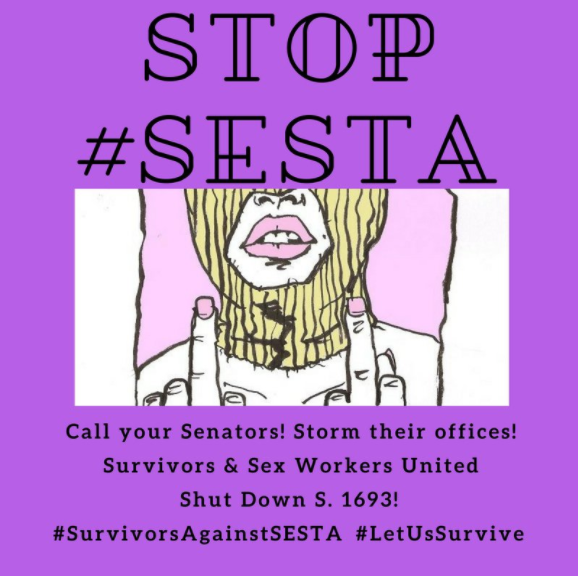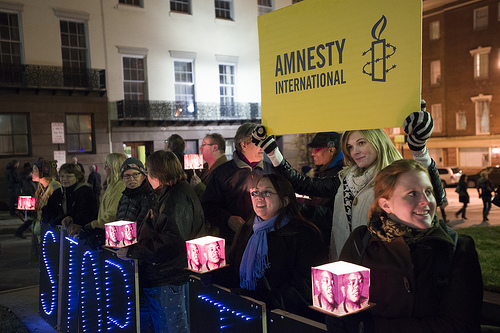Sex Workers Are Not Collateral Damage: Kate D’Adamo on FOSTA and SESTA

Both sex workers’ rights and anti-trafficking organizations have been watching a bill winding its way through Congress for a while. Here at Tits and Sass, we’ve had plenty to say about it. SESTA, the Stop Enabling Sex Trafficking Act, the Senate version of the bill, would have been disastrous enough—it would create a trafficking-related loophole in section 230 of the Communications Decency Act, the law which allows the internet to function by not holding service providers liable for user posting content. In practice, that would outlaw all sex worker advertising sites by opening them up to endless lawsuits, since any of them can be used for trafficking. That would send vulnerable people back into the streets and other dangerous venues and back into the hands of potentially abusive managers. Just think about the economic panic which followed the closures of Craigslist, MyRedBook, TNA, and Backpage’s adult section and multiply it a thousandfold if you want to imagine the impact this could have on the most defenseless members of our community. And as usual, when the sex trade is driven further underground, trafficking victims suffer as everyone around them is criminalized further, and they are further isolated with no one to turn to but their traffickers.
But the version that passed the House by an overwhelming majority last Thursday, FOSTA, the Allow States And Victims To Fight Online Sex Trafficking Act, was even worse. It criminalizes “promoting” and “facilitating” prostitution without defining these terms, placing vital sex worker online harm reduction resources which both voluntary and trafficked sex workers rely on at risk, such as the verification sites and bad call lists we use to avoid violent clients. This blog you’re reading now could fall in the crosshairs of this legislation as well, as could other sites of sex worker community, making it much harder for an already closeted and stigmatized group of marginalized people to forge vital social and political connections with each other. FOSTA also includes damaging new additions such as a retiring Republican congressman’s clause expanding the Mann Act. It is a bill that has morphed into something much broader and more hurtful than its cosponsors originally envisioned, with law enforcement, social services, the ACLU, EFF, the National Organization for Women, AIDS United and even anti-trafficking organizations as well as the Department of Justice opposing it. Yet representatives rushed to embrace it in a show of bipartisan cooperation.
It seems likely that the Senate debate and vote on SESTA will take place on Monday, March 12th. If SESTA passes the Senate, the next step would be reconciliation between FOSTA and SESTA into one no doubt catastrophic law. Today and tomorrow, just as sex workers, free speech organizations, and anti-trafficking organizations mobilized against FOSTA in the House, tweet storms and phone/fax/email jams are planned nationally against this Senate vote on SESTA. We urge all our readers to call their Senators and encourage their social networks to do the same. Scroll down to the bottom of this post for more information and a sample call script.
Longtime sex work and trafficking policy researcher and Reframe Health and Justice partner Kate D’Adamo has led the sex worker and trafficking survivor charge against the House and now the Senate vote. Tits and Sass caught up with her last weekend to ask her what every sex worker should know about FOSTA and SESTA.
How did you mobilize action on the House vote so quickly? Are there any other organizations and individuals whose efforts against FOSTA you’d like to highlight?
This is so far from a solo effort! None of this would have been possible without Red from Support Ho(s)e and the group MASWAN doing some of the most fantastic grassroots organizing work. On the national support and lobbying front, the National Center for Lesbian Rights and the National Center for Transgender Equality have truly shown up.
I think things mobilized so quickly because people have been waiting for a moment to plug in. A lot of times sex worker rights, and movement work in general, can feel intangible; SESTA isn’t and its impacts certainly won’t be. Which also points to how long we have been laying the groundwork. When I talk about what would be impacted, it’s because this movement has been doing harm reduction and anti-violence work for years, finding ways to turn online spaces into community and safety. When folks are connecting online and calling their reps and senators, it’s because we can stand on decades of sex workers demanding liberation and justice.



